The Cambridge History of China. Vol. 13: Republican China 1912-1949, Part 2
Подождите немного. Документ загружается.

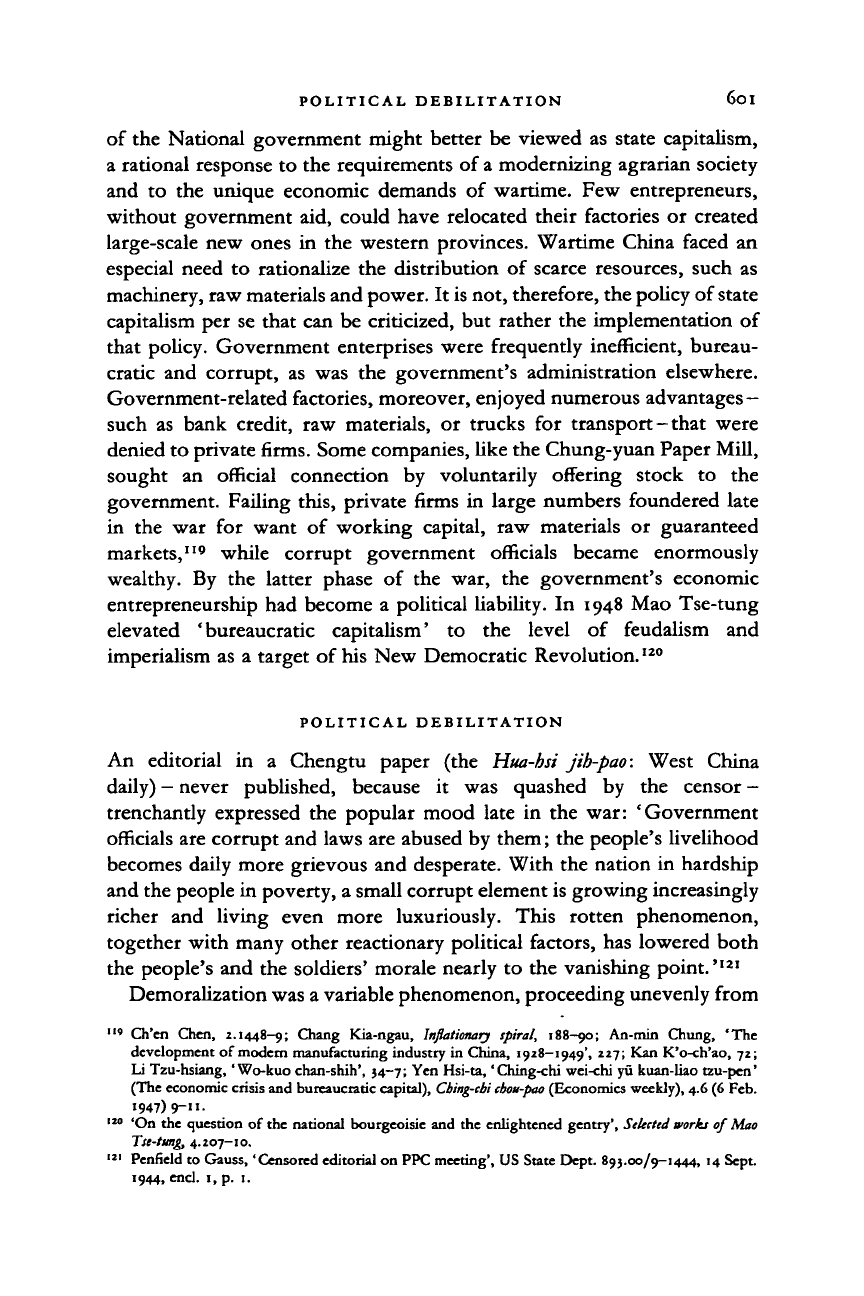
POLITICAL DEBILITATION 6oi
of the National government might better be viewed as state capitalism,
a rational response to the requirements of
a
modernizing agrarian society
and
to the
unique economic demands
of
wartime. Few entrepreneurs,
without government aid, could have relocated their factories
or
created
large-scale new ones
in
the western provinces. Wartime China faced
an
especial need
to
rationalize the distribution
of
scarce resources, such
as
machinery, raw materials and power. It is not, therefore, the policy of state
capitalism per se that can be criticized, but rather the implementation
of
that policy. Government enterprises were frequently inefficient, bureau-
cratic and corrupt,
as
was
the
government's administration elsewhere.
Government-related factories, moreover, enjoyed numerous advantages-
such
as
bank credit, raw materials,
or
trucks
for
transport
—
that were
denied to private firms. Some companies, like the Chung-yuan Paper Mill,
sought
an
official connection
by
voluntarily offering stock
to the
government. Failing this, private firms
in
large numbers foundered late
in
the
war
for
want
of
working capital, raw materials
or
guaranteed
markets,
119
while corrupt government officials became enormously
wealthy.
By the
latter phase
of the
war,
the
government's economic
entrepreneurship had become
a
political liability.
In
1948 Mao Tse-tung
elevated 'bureaucratic capitalism'
to the
level
of
feudalism
and
imperialism as
a
target
of
his New Democratic Revolution.
120
POLITICAL DEBILITATION
An editorial
in a
Chengtu paper
(the
Hua-hsi
jih-pao: West China
daily)
-
never published, because
it was
quashed
by the
censor
-
trenchantly expressed the popular mood late
in
the war: 'Government
officials are corrupt and laws are abused by them; the people's livelihood
becomes daily more grievous and desperate. With the nation in hardship
and the people in poverty, a small corrupt element is growing increasingly
richer
and
living even more luxuriously. This rotten phenomenon,
together with many other reactionary political factors, has lowered both
the people's and the soldiers' morale nearly
to
the vanishing point.'
121
Demoralization was a variable phenomenon, proceeding unevenly from
'" Ch'en Chen, 2.1448-9; Chang Kia-ngau,
Inflationary
spiral, 188-90; An-min Chung,
'The
development of modern manufacturing industry in China, 1928—1949', 227; Kan K'o-ch'ao, 72;
Li Tzu-hsiang, 'Wo-kuo chan-shih', 34-7; Yen Hsi-ta, 'Ching-chi wei-chi yu kuan-liao tzu-pen'
(The economic crisis and bureaucratic capital),
Cbing-cbi chou-pao
(Economics weekly), 4.6 (6 Feb.
•947)9-
!I
-
120
'On the
question
of
the
national bourgeoisie
and the
enlightened gentry', Selected works
of
Mao
Tse-tung, 4.207—10.
121
Penfield
to
Gauss, 'Censored editorial
on PPC
meeting',
US
State Dept. 893.00/9-1444,
14
Sept.
1944,
end. 1, p.
1.
Cambridge Histories Online © Cambridge University Press, 2008
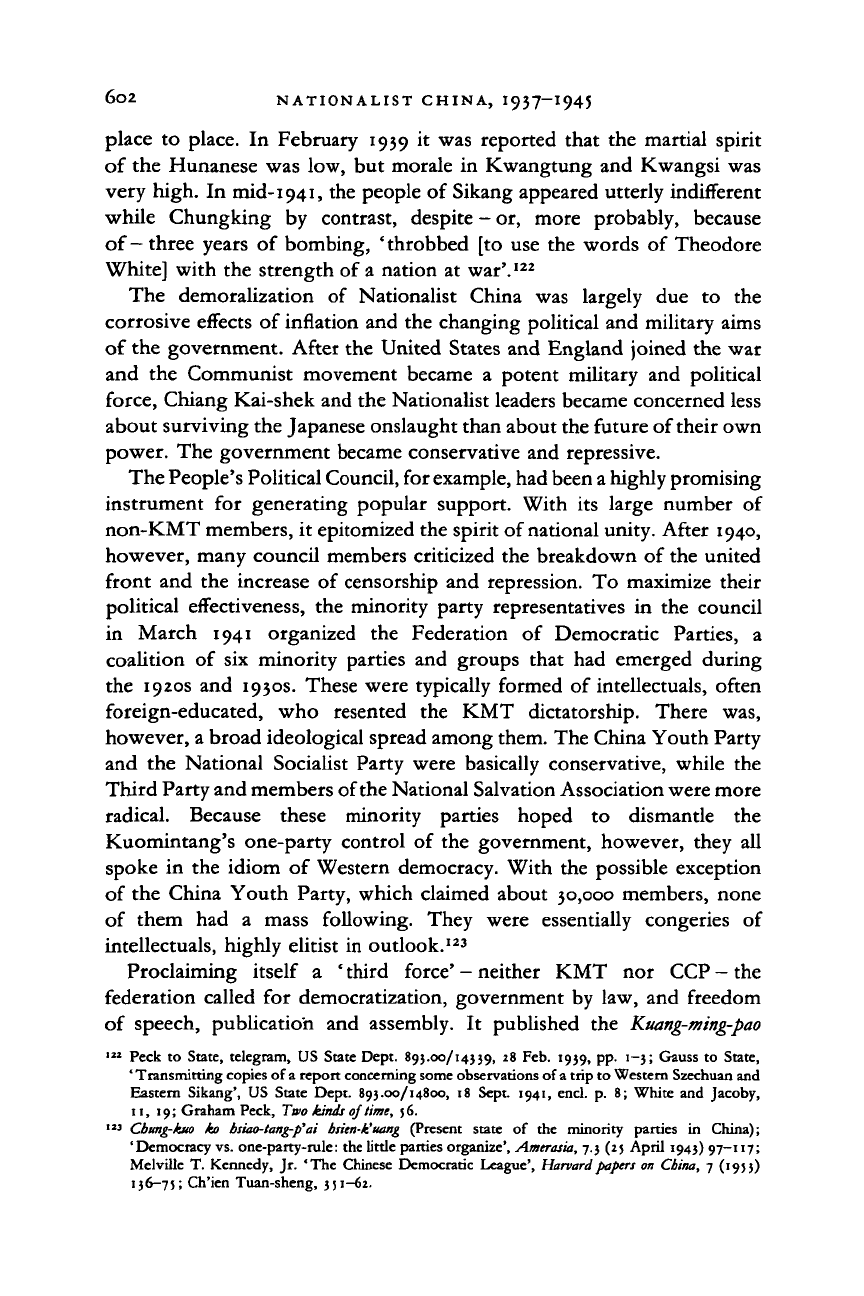
6O2
NATIONALIST CHINA, I937-I945
place
to
place.
In
February 1939
it
was reported that the martial spirit
of the Hunanese was low, but morale
in
Kwangtung and Kwangsi was
very high. In mid-1941, the people of Sikang appeared utterly indifferent
while Chungking
by
contrast, despite
-
or, more probably, because
of
-
three years
of
bombing, ' throbbed [to use the words
of
Theodore
White] with the strength of a nation at war'.
122
The demoralization
of
Nationalist China
was
largely
due to the
corrosive effects of inflation and the changing political and military aims
of the government. After the United States and England joined the war
and
the
Communist movement became
a
potent military and political
force, Chiang Kai-shek and the Nationalist leaders became concerned less
about surviving the Japanese onslaught than about the future of their own
power. The government became conservative and repressive.
The People's Political Council, for
example,
had been a highly promising
instrument
for
generating popular support. With
its
large number
of
non-KMT members, it epitomized the spirit of national unity. After 1940,
however, many council members criticized the breakdown of the united
front and the increase
of
censorship and repression. To maximize their
political effectiveness, the minority party representatives
in
the council
in March 1941 organized
the
Federation
of
Democratic Parties,
a
coalition
of
six minority parties and groups that had emerged during
the 1920s and 1930s. These were typically formed
of
intellectuals, often
foreign-educated,
who
resented
the
KMT dictatorship. There
was,
however, a broad ideological spread among them. The China Youth Party
and the National Socialist Party were basically conservative, while
the
Third Party and members of the National Salvation Association were more
radical. Because these minority parties hoped
to
dismantle
the
Kuomintang's one-party control
of
the government, however, they
all
spoke
in
the idiom
of
Western democracy. With the possible exception
of the China Youth Party, which claimed about 30,000 members, none
of them
had a
mass following. They were essentially congeries
of
intellectuals, highly elitist in outlook.
123
Proclaiming itself
a
' third force'
-
neither
KMT nor
CCP
-
the
federation called
for
democratization, government by law, and freedom
of speech, publication and assembly.
It
published
the
Kuang-ming-pao
122
Peck
to
State, telegram, US State Dept. 893.00/14539, 28 Feb. 1939, pp. 1—3; Gauss
to
State,
'Transmitting copies of a report concerning some observations of a
trip
to Western Szechuan and
Eastern Sikang', US State Dept. 893.00/14800,
18
Sept. 1941, end.
p. 8;
White and Jacoby,
11,
19; Graham Peck,
Two kinds
of time,
;6.
I2
'
Cbung-kuo
ko
bsiao-tang-p'ai bsien-Huang
(Present state
of the
minority parties
in
China);
'Democracy vs. one-party-rule: the little parties organize',
Amerasia,
7.3 (25 April 1943) 97-117;
Melville T. Kennedy, Jr. "The Chinese Democratic League',
Harvard papers on
China,
7
(1953)
136-75;
Ch'ien Tuan-sheng, 3; 1-62.
Cambridge Histories Online © Cambridge University Press, 2008
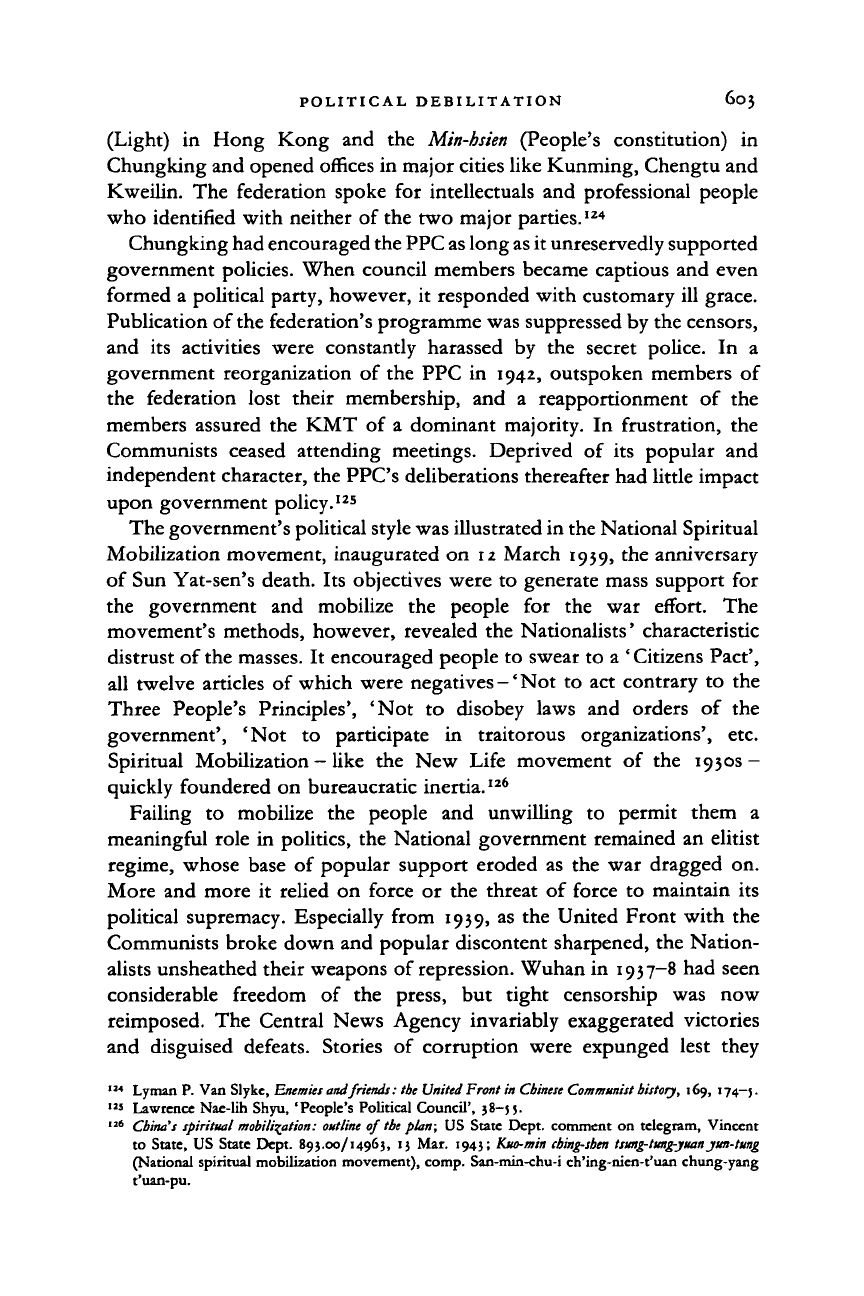
POLITICAL DEBILITATION 603
(Light) in Hong Kong and the Min-hsien (People's constitution) in
Chungking and opened offices in major cities like Kunming, Chengtu and
Kweilin. The federation spoke for intellectuals and professional people
who identified with neither of the two major parties.
124
Chungking had encouraged the PPC as long
as
it unreservedly supported
government policies. When council members became captious and even
formed a political party, however, it responded with customary ill grace.
Publication of the federation's programme was suppressed by the censors,
and its activities were constantly harassed by the secret police. In a
government reorganization of the PPC in 1942, outspoken members of
the federation lost their membership, and a reapportionment of the
members assured the KMT of a dominant majority. In frustration, the
Communists ceased attending meetings. Deprived of its popular and
independent character, the PPC's deliberations thereafter had little impact
upon government policy.
125
The government's political style was illustrated in the National Spiritual
Mobilization movement, inaugurated on 12 March 1939, the anniversary
of Sun Yat-sen's death. Its objectives were to generate mass support for
the government and mobilize the people for the war effort. The
movement's methods, however, revealed the Nationalists' characteristic
distrust of the masses. It encouraged people to swear to a ' Citizens Pact',
all twelve articles of which were negatives -' Not to act contrary to the
Three People's Principles', 'Not to disobey laws and orders of the
government', 'Not to participate in traitorous organizations', etc.
Spiritual Mobilization - like the New Life movement of the 1930s -
quickly foundered on bureaucratic inertia.
126
Failing to mobilize the people and unwilling to permit them a
meaningful role in politics, the National government remained an elitist
regime, whose base of popular support eroded as the war dragged on.
More and more it relied on force or the threat of force to maintain its
political supremacy. Especially from 1939, as the United Front with the
Communists broke down and popular discontent sharpened, the Nation-
alists unsheathed their weapons of repression. Wuhan in 1937-8 had seen
considerable freedom of the press, but tight censorship was now
reimposed. The Central News Agency invariably exaggerated victories
and disguised defeats. Stories of corruption were expunged lest they
124
Lyman P. Van Slyke, Enemies andfriends: the United Front in
Chinese
Communist history, 169, 174—5.
123
Lawrence Nae-lih Shyu, 'People's Political Council', 58-55.
126
China's spiritual mobilisation: outline of the plan; US State Dept. comment on telegram, Vincent
to State, US State Dept. 893.00/14965, 15 Mar. 1945; Kuo-min
cbmg-skcn
tsung-tung-juan jun-tung
(National spiritual mobilization movement), comp. San-min-chu-i ch'ing-nien-t'uan chung-yang
t'uan-pu.
Cambridge Histories Online © Cambridge University Press, 2008
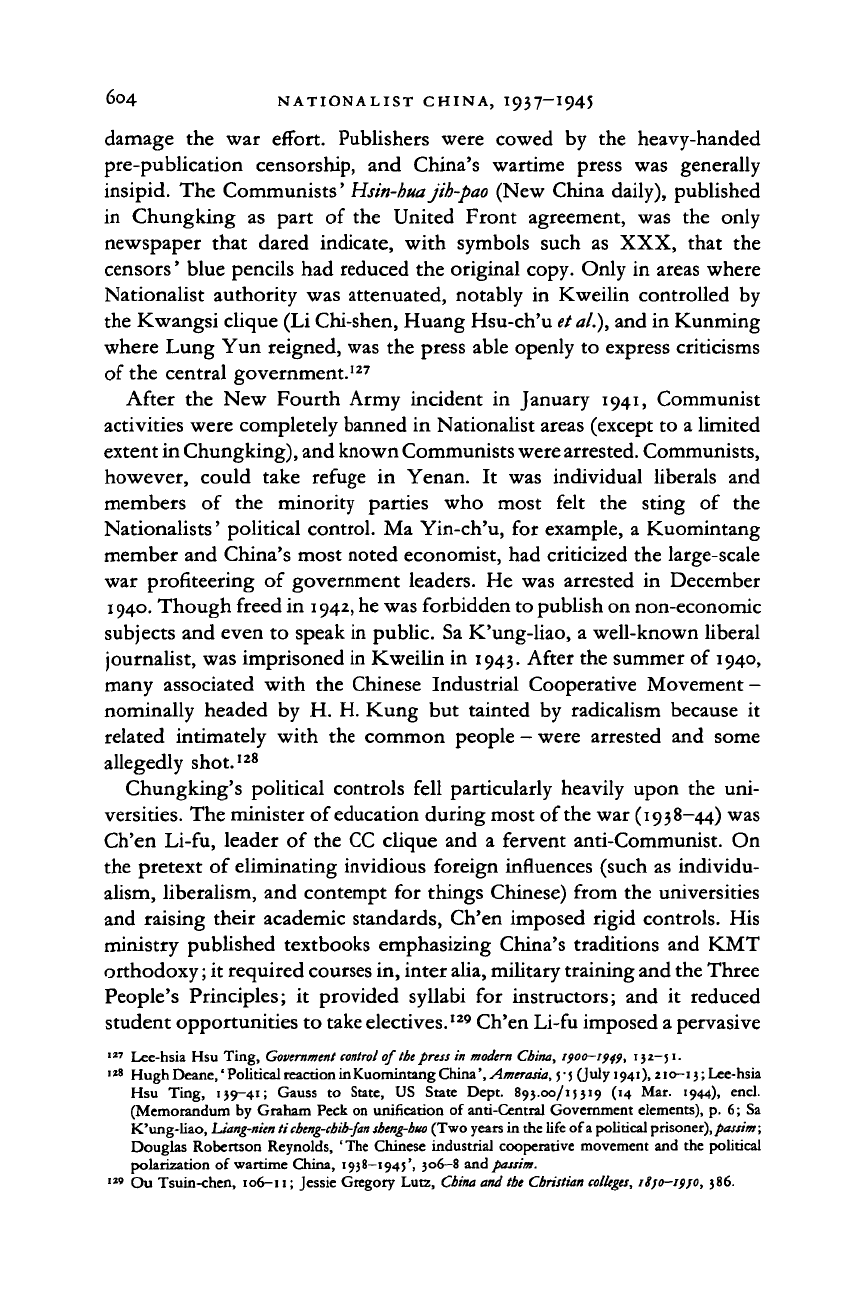
604 NATIONALIST CHINA, I937-I945
damage
the
war effort. Publishers were cowed
by
the heavy-handed
pre-publication censorship, and China's wartime press was generally
insipid. The Communists' Hsin-hua jih-pao (New China daily), published
in Chungking
as
part
of
the United Front agreement, was the only
newspaper that dared indicate, with symbols such
as
XXX, that the
censors' blue pencils had reduced the original copy. Only in areas where
Nationalist authority was attenuated, notably
in
Kweilin controlled by
the Kwangsi clique (Li Chi-shen, Huang Hsu-ch'u
et
al!),
and in Kunming
where Lung Yun reigned, was the press able openly to express criticisms
of the central government.
127
After the New Fourth Army incident
in
January 1941, Communist
activities were completely banned in Nationalist areas (except to a limited
extent in Chungking), and known Communists were
arrested.
Communists,
however, could take refuge
in
Yenan.
It
was individual liberals and
members
of the
minority parties who most felt
the
sting
of the
Nationalists' political control. Ma Yin-ch'u, for example, a Kuomintang
member and China's most noted economist, had criticized the large-scale
war profiteering
of
government leaders. He was arrested
in
December
1940.
Though freed in
1942,
he was forbidden to publish on non-economic
subjects and even to speak in public. Sa K'ung-liao, a well-known liberal
journalist, was imprisoned in Kweilin in 1943. After the summer of 1940,
many associated with the Chinese Industrial Cooperative Movement
-
nominally headed by H. H. Kung but tainted by radicalism because
it
related intimately with the common people
-
were arrested and some
allegedly shot.
128
Chungking's political controls fell particularly heavily upon the uni-
versities. The minister of education during most of
the
war (1938-44) was
Ch'en Li-fu, leader of the CC clique and
a
fervent anti-Communist. On
the pretext of eliminating invidious foreign influences (such as individu-
alism, liberalism, and contempt for things Chinese) from the universities
and raising their academic standards, Ch'en imposed rigid controls. His
ministry published textbooks emphasizing China's traditions and KMT
orthodoxy; it required courses in, inter aha, military training and the Three
People's Principles;
it
provided syllabi
for
instructors; and
it
reduced
student opportunities to take electives.
129
Ch'en Li-fu imposed a pervasive
127
Lee-hsia Hsu Ting, Government
control
of
the press in modern China,
rpoo-tpjf,
132-51.
1Z8
Hugh Deane,' Political reaction in Kuomintang China',
Amerasia,
5 • j
(Juty '94').
2
IO
~
1
5;
Lee-hsia
Hsu Ting,
1J9-41;
Gauss
to
State,
US
State Dept. 893.00/15319
(14
Mar. 1944),
end.
(Memorandum by Graham Peck on unification of anti-Central Government elements), p. 6; Sa
K'ung-liao,
Uang-nien ticbeng-cbib-jan sbeng-buo
(Two years in the life of a political prisoner),/>a«/>x;
Douglas Robertson Reynolds, 'The Chinese industrial cooperative movement and the political
polarization of wartime China, 1938—1945', 306—8 and
passim.
IM
Ou Tsuin-chen,
106—11;
Jessie Gregory Lutz,
China and the Christian
colleges,
iSf
0—19/0,
386.
Cambridge Histories Online © Cambridge University Press, 2008
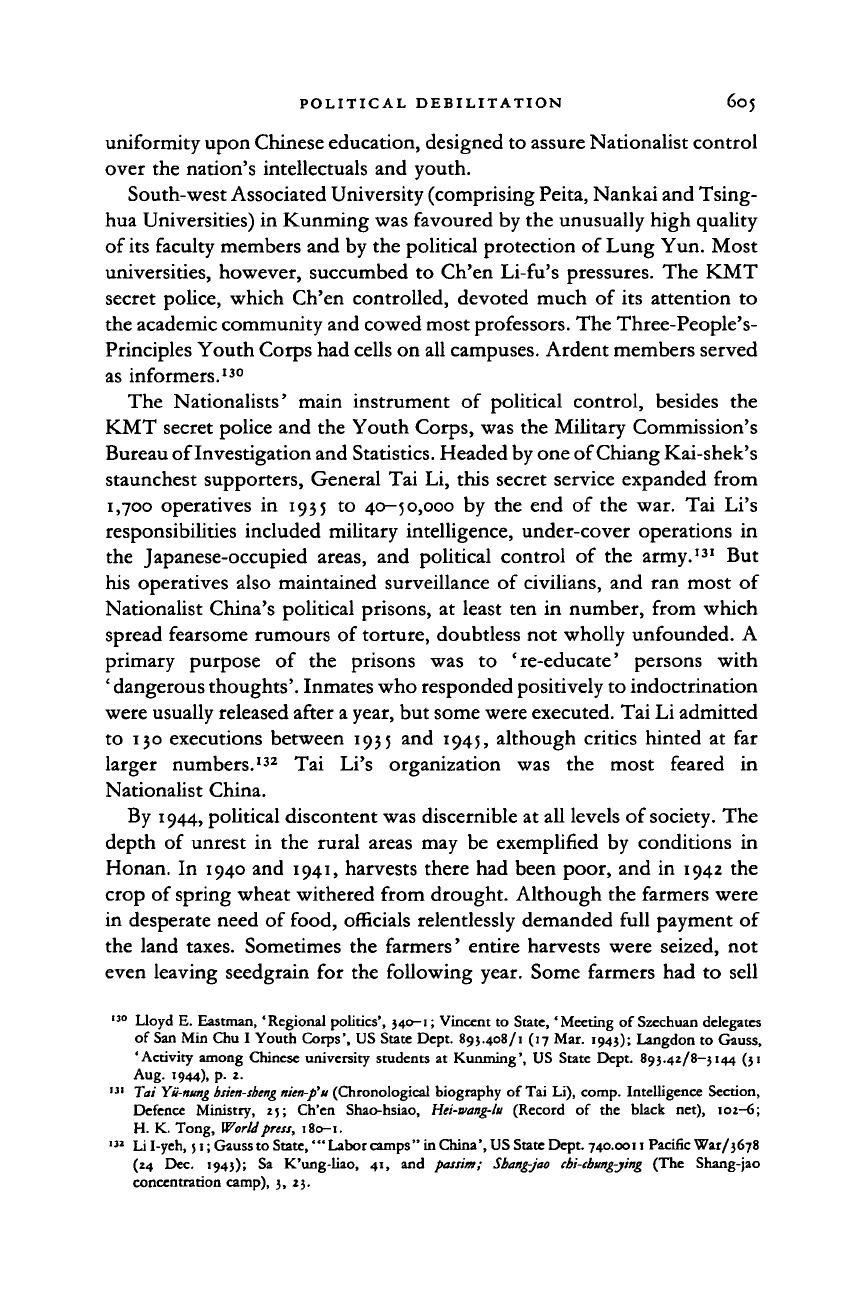
POLITICAL DEBILITATION 605
uniformity upon Chinese education, designed to assure Nationalist control
over the nation's intellectuals and youth.
South-west Associated University (comprising Peita, Nankai and Tsing-
hua Universities) in Kunming was favoured by the unusually high quality
of its faculty members and by the political protection of Lung Yun. Most
universities, however, succumbed to Ch'en Li-fu's pressures. The KMT
secret police, which Ch'en controlled, devoted much of its attention to
the academic community and cowed most professors. The Three-People's-
Principles Youth Corps had cells on all campuses. Ardent members served
as informers.
130
The Nationalists' main instrument
of
political control, besides the
KMT secret police and the Youth Corps, was the Military Commission's
Bureau of Investigation and Statistics. Headed by one of Chiang Kai-shek's
staunchest supporters, General Tai Li, this secret service expanded from
1,700 operatives in 1935 to 40—50,000 by the end of the war. Tai Li's
responsibilities included military intelligence, under-cover operations in
the Japanese-occupied areas, and political control
of
the army.
131
But
his operatives also maintained surveillance of civilians, and ran most of
Nationalist China's political prisons, at least ten in number, from which
spread fearsome rumours of torture, doubtless not wholly unfounded. A
primary purpose
of
the prisons was
to
're-educate' persons with
' dangerous thoughts'. Inmates who responded positively to indoctrination
were usually released after a year, but some were executed. Tai Li admitted
to 130 executions between 1935 and 1945, although critics hinted at far
larger numbers.
132
Tai Li's
organization
was the
most feared
in
Nationalist China.
By 1944, political discontent was discernible at all levels of
society.
The
depth of unrest in the rural areas may be exemplified by conditions in
Honan. In 1940 and 1941, harvests there had been poor, and in 1942 the
crop of spring wheat withered from drought. Although the farmers were
in desperate need of food, officials relentlessly demanded full payment of
the land taxes. Sometimes the farmers' entire harvests were seized, not
even leaving seedgrain for the following year. Some farmers had to sell
130
Lloyd E. Eastman, 'Regional polities',
340-1;
Vincent to State, 'Meeting of Szechuan delegates
of
San Min Chu
I
Youth Corps', US State Dept. 893.408/1 (17 Mar. 1943); Langdon to Gauss,
'Activity
among Chinese university students at Kunming', US State Dept. 893.42/8—3144 (31
Aug.
1944), p.
2.
131
Tai
Yu-nung bsien-sbeng
nien-p'u (Chronological biography of Tai Li),
comp.
Intelligence Section,
Defence
Ministry,
25;
Ch'en Shao-hsiao, Hei-wang-lu (Record
of
the black net), 102-6;
H. K. Tong,
World
press,
180-1.
132
Li
I-yeh,
51;
Gauss
to
State,'"
Labor
camps"
in
China',
US
State
Dept.
740.0011 Pacific War/3678
(24
Dec.
1943);
Sa
K'ung-liao,
41, and
passim;
Sbang-jao cbi-cbung-jing
(The
Shang-jao
concentration
camp),
3, 23.
Cambridge Histories Online © Cambridge University Press, 2008
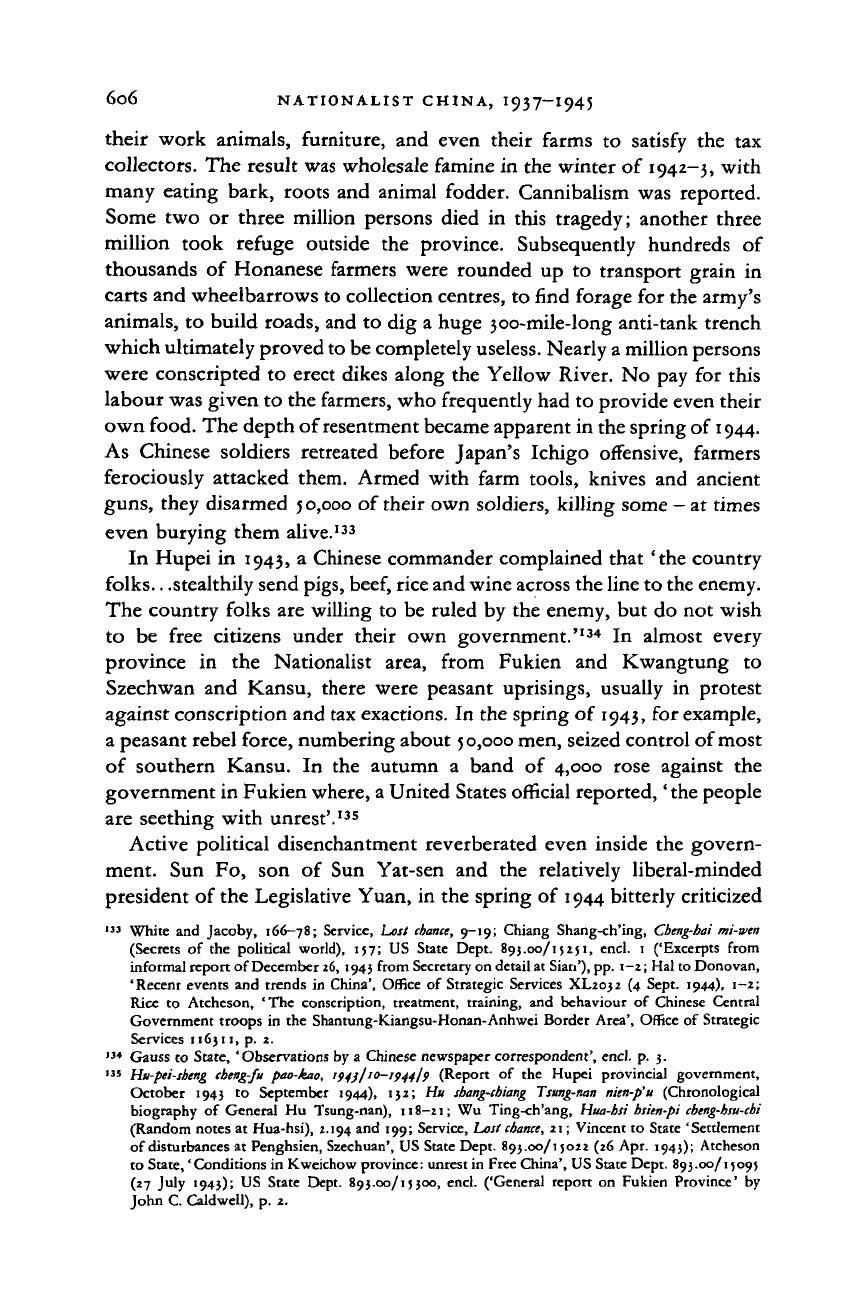
6o6
NATIONALIST CHINA, 1937—1945
their work animals, furniture,
and
even their farms
to
satisfy
the tax
collectors. The result was wholesale famine in the winter
of
1942-3, with
many eating bark, roots and animal fodder. Cannibalism was reported.
Some two
or
three million persons died
in
this tragedy; another three
million took refuge outside
the
province. Subsequently hundreds
of
thousands
of
Honanese farmers were rounded
up to
transport grain
in
carts and wheelbarrows to collection centres, to find forage for the army's
animals,
to
build roads, and to dig a huge 300-mile-long anti-tank trench
which ultimately proved to be completely
useless.
Nearly a million persons
were conscripted
to
erect dikes along the Yellow River. No pay for this
labour was given to the farmers, who frequently had to provide even their
own food. The depth of resentment became apparent in the spring of 1944.
As Chinese soldiers retreated before Japan's Ichigo offensive, farmers
ferociously attacked them. Armed with farm tools, knives and ancient
guns,
they disarmed 5 0,000 of their own soldiers, killing some
-
at times
even burying them alive.
133
In Hupei
in
1943,
a
Chinese commander complained that 'the country
folks..
.stealthily send
pigs,
beef,
rice and wine across the line to the enemy.
The country folks are willing to be ruled by the enemy, but do not wish
to
be
free citizens under their own government.'
134
In
almost every
province
in the
Nationalist area, from Fukien
and
Kwangtung
to
Szechwan
and
Kansu, there were peasant uprisings, usually
in
protest
against conscription and tax exactions. In the spring
of
1943,
for example,
a peasant rebel force, numbering about 50,000 men, seized control of most
of southern Kansu.
In the
autumn
a
band
of
4,000 rose against
the
government in Fukien where, a United States official reported,'
the
people
are seething with unrest'.
135
Active political disenchantment reverberated even inside the govern-
ment.
Sun Fo, son of
Sun Yat-sen
and the
relatively liberal-minded
president of the Legislative Yuan, in the spring
of
1944 bitterly criticized
133
White
and
Jacoby, 166-78; Service, Lost chance, 9-19; Chiang Shang-ch'ing, Cbeng-bai mi-wen
(Secrets
of
the
political world),
157; US
State Dept. 893.00/15251, encl.
1
('Excerpts
from
informal report of December 26,1943 from Secretary on detail
at
Sian'), pp.
1-2;
Hal
to
Donovan,
'Recent events
and
trends
in
China', Office
of
Strategic Services XL2032
(4
Sept. 1944),
1—2;
Rice
to
Atcheson,
'The
conscription, treatment, training,
and
behaviour
of
Chinese Central
Government troops
in the
Shantung-Kiangsu-Honan-Anhwei Border Area', Office
of
Strategic
Services 116311,
p.
2.
134
Gauss
to
Sate, 'Observations
by
a
Chinese newspaper correspondent', encl.
p.
3.
135
Hu-pei-sbeng cbeng-fu pao-kao, 1943/10-1944/9 (Report
of
the
Hupei provincial government,
October
1943
to
September 1944),
132; H»
sbang-cbiang Tsung-nan nicn-p'u (Chronological
biography
of
General
Hu
Tsung-nan),
118-21;
Wu
Ting-ch'ang, Hua-bsi bsicn-pi cbeng-bsu-cbi
(Random notes
at
Hua-hsi), 2.194 and 199; Service, Lost chance, 21; Vincent
to
State 'Settlement
of disturbances
at
Penghsien, Szechuan', US State Dept. 893.00/15022 (26 Apr. 1943); Atcheson
to State,'Conditions in Kweichow province: unrest in Free China', US State Dept. 893.00/15095
(27 July 1943);
US
State Dept. 895.00/15300, encl. ('General report
on
Fukien Province'
by
John C. Caldwell), p.
2.
Cambridge Histories Online © Cambridge University Press, 2008
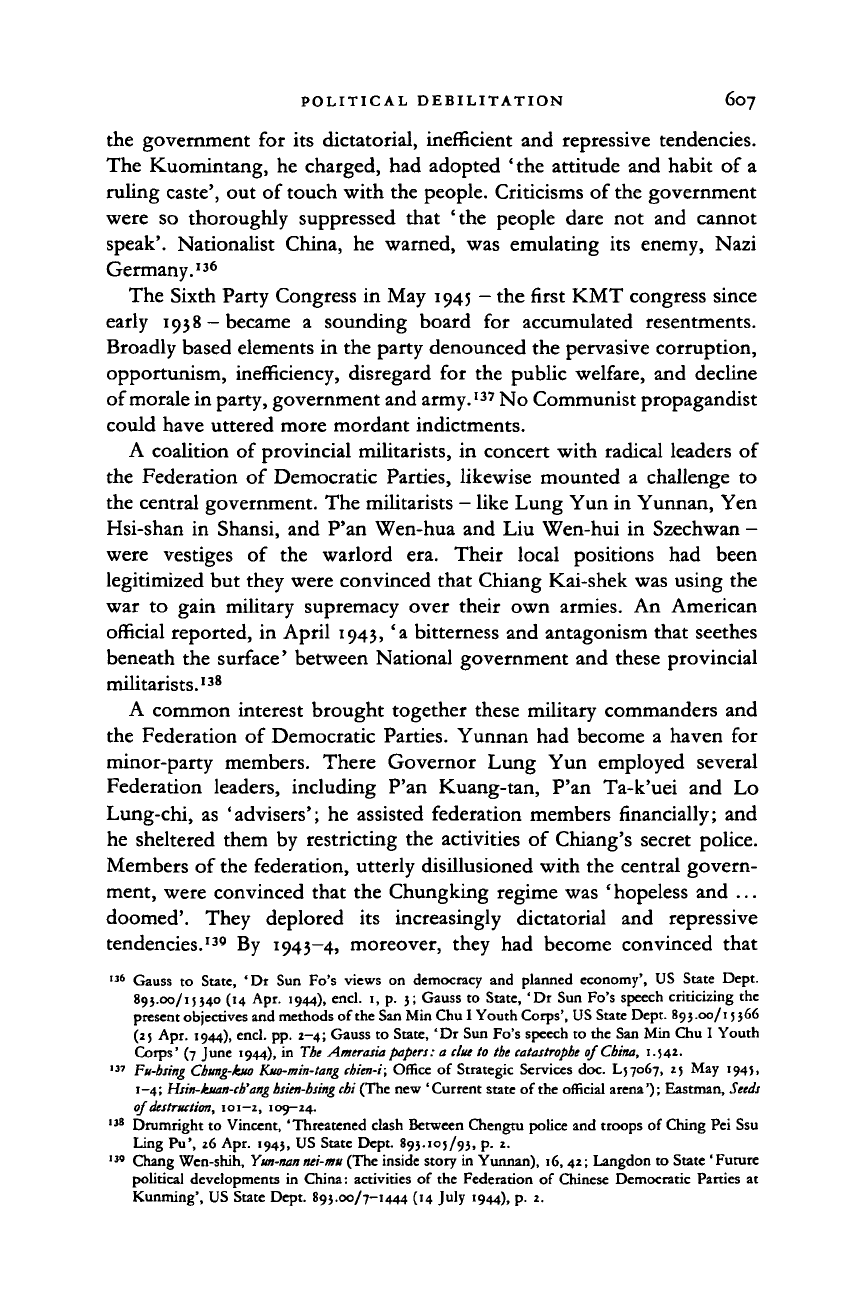
POLITICAL DEBILITATION 607
the government for its dictatorial, inefficient and repressive tendencies.
The Kuomintang, he charged, had adopted ' the attitude and habit of a
ruling caste', out of touch with the people. Criticisms of the government
were so thoroughly suppressed that 'the people dare not and cannot
speak'. Nationalist China, he warned, was emulating its enemy, Nazi
Germany.
136
The Sixth Party Congress in May 1945
-
the first KMT congress since
early 1938-became
a
sounding board
for
accumulated resentments.
Broadly based elements in the party denounced the pervasive corruption,
opportunism, inefficiency, disregard for the public welfare, and decline
of morale in party, government and army.
137
No Communist propagandist
could have uttered more mordant indictments.
A coalition of provincial militarists, in concert with radical leaders of
the Federation of Democratic Parties, likewise mounted
a
challenge to
the central government. The militarists
—
like Lung Yun in Yunnan, Yen
Hsi-shan in Shansi, and P'an Wen-hua and Liu Wen-hui in Szechwan
—
were vestiges
of
the warlord era. Their local positions
had
been
legitimized but they were convinced that Chiang Kai-shek was using the
war to gain military supremacy over their own armies. An American
official reported, in April 194}, 'a bitterness and antagonism that seethes
beneath the surface' between National government and these provincial
militarists.
138
A common interest brought together these military commanders and
the Federation of Democratic Parties. Yunnan had become a haven for
minor-party members. There Governor Lung Yun employed several
Federation leaders, including P'an Kuang-tan, P'an Ta-k'uei and
Lo
Lung-chi, as 'advisers'; he assisted federation members
financially;
and
he sheltered them by restricting the activities of Chiang's secret police.
Members of the federation, utterly disillusioned with the central govern-
ment, were convinced that the Chungking regime was ' hopeless and
...
doomed'. They deplored
its
increasingly dictatorial
and
repressive
tendencies.
139
By 1943—4, moreover, they had become convinced that
136
Gauss
to
State,
'Dt Sun Fo's
views
on
democracy
and
planned economy',
US
State Dept.
893.oo/ij}4o
(14 Apr.
1944), encl.
i,
p. 3;
Gauss
to
State,
'Dr Sun Fo's
speech criticizing
the
present objectives
and
methods
of
the
San Min Chu I
Youth Corps',
US
State Dept. 893.00/15
366
(25
Apr.
1944), encl.
pp. 2-4;
Gauss
to
State,
'Dr Sun Fo's
speech
to the San Min Chu
I
Youth
Corps'
(7
June 1944),
in The
Amerasia papers:
a
clue
to tbe
catastrophe
of
China, i.}4
2
'
137
Fu-bsing Cbung-kuo Km-min-tang cbien-i; Office
of
Strategic Services
doc.
L57067,
25 May 1945,
1-4; tisin-kuan-cb'ang bsien-bsing
cbi
(The
new
' Current state
of
the official arena'); Eastman, Seeds
of
destruction,
101—2,
109—24.
138
Drumright
to
Vincent, 'Threatened clash Between Chengru police
and
troops
of
Ching
Pei Ssu
Ling
Pu', 26 Apr. 1943, US
State Dept. 893.105/93,
p. 2.
139
Chang Wcn-shih, Yun-nan nei-mu
(The
inside story
in
Yunnan),
16, 42;
Langdon
to
State ' Future
political developments
in
China: activities
of the
Federation
of
Chinese Democratic Parties
at
Kunming',
US
State Dept. 893.00/7-1444
(14
July 1944),
p. 2.
Cambridge Histories Online © Cambridge University Press, 2008
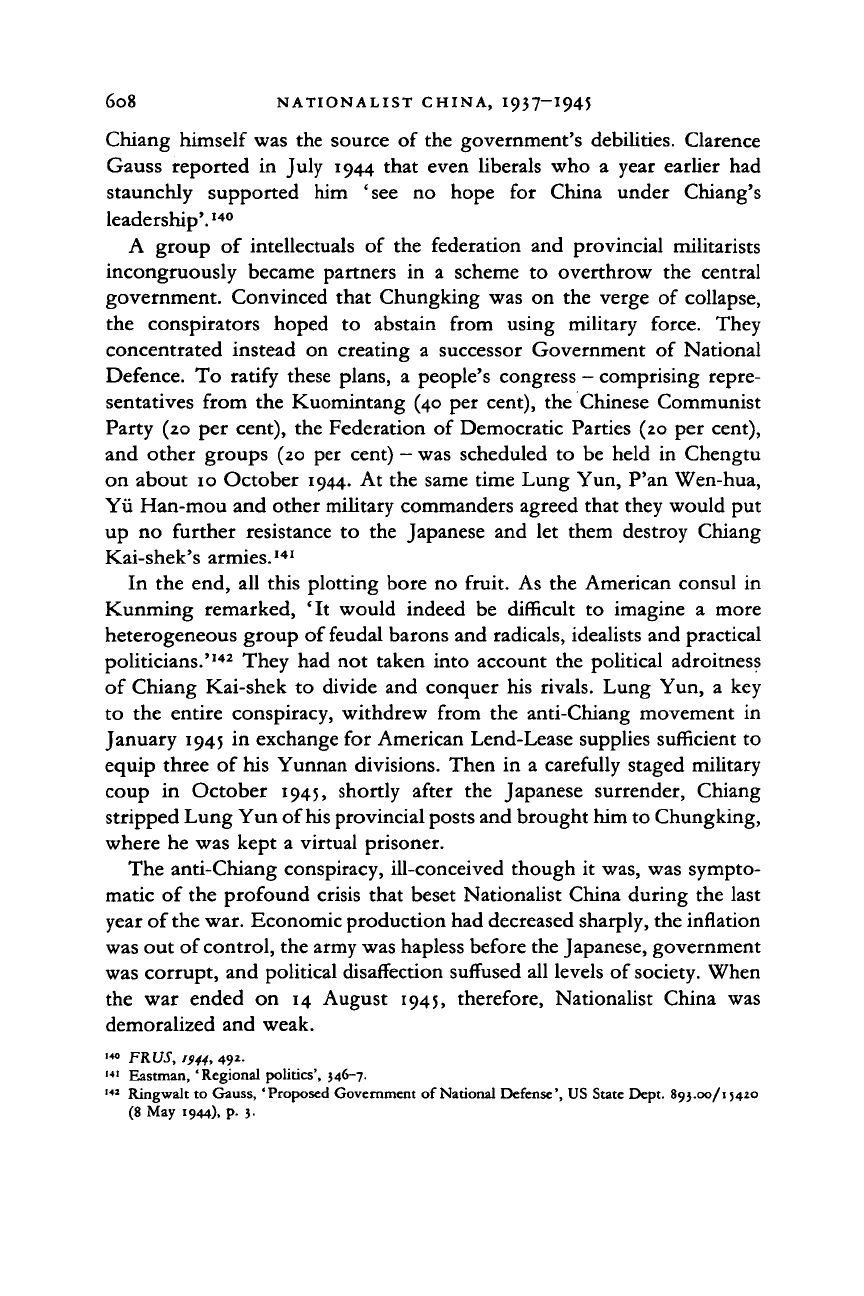
608 NATIONALIST CHINA, I937-I945
Chiang himself was the source
of
the government's debilities. Clarence
Gauss reported
in
July 1944 that even liberals who
a
year earlier had
staunchly supported
him 'see no
hope
for
China under Chiang's
leadership'.
140
A group
of
intellectuals
of
the federation and provincial militarists
incongruously became partners
in a
scheme
to
overthrow
the
central
government. Convinced that Chungking was
on
the verge
of
collapse,
the conspirators hoped
to
abstain from using military force. They
concentrated instead
on
creating
a
successor Government
of
National
Defence.
To
ratify these plans,
a
people's congress
—
comprising repre-
sentatives from the Kuomintang (40 per cent), the Chinese Communist
Party (20 per cent), the Federation
of
Democratic Parties (20 per cent),
and other groups (20 per cent)
—
was scheduled
to be
held
in
Chengtu
on about 10 October 1944. At the same time Lung Yun, P'an Wen-hua,
Yii Han-mou and other military commanders agreed that they would put
up
no
further resistance
to
the Japanese and
let
them destroy Chiang
Kai-shek's armies.
141
In the end, all this plotting bore no fruit. As the American consul
in
Kunming remarked,
'It
would indeed
be
difficult
to
imagine
a
more
heterogeneous group of feudal barons and radicals, idealists and practical
politicians.'
142
They had not taken into account the political adroitness
of Chiang Kai-shek
to
divide and conquer his rivals. Lung Yun,
a
key
to the entire conspiracy, withdrew from the anti-Chiang movement
in
January 1945 in exchange for American Lend-Lease supplies sufficient to
equip three
of
his Yunnan divisions. Then
in a
carefully staged military
coup
in
October 1945, shortly after
the
Japanese surrender, Chiang
stripped Lung Yun of his provincial posts and brought him to Chungking,
where he was kept
a
virtual prisoner.
The anti-Chiang conspiracy, ill-conceived though
it
was, was sympto-
matic
of
the profound crisis that beset Nationalist China during the last
year of the war. Economic production had decreased sharply, the inflation
was out of control, the army was hapless before the Japanese, government
was corrupt, and political disaffection suffused all levels of society. When
the
war
ended
on 14
August 1945, therefore, Nationalist China was
demoralized and weak.
•« FRUS,
1944,
49*-
Ml
Eastman,'Regional polities', 346-7.
142
Ringwalt to Gauss, 'Proposed Government of National Defense', US State Dept. 89}.00/15440
(8 May 1944), p.
3.
Cambridge Histories Online © Cambridge University Press, 2008
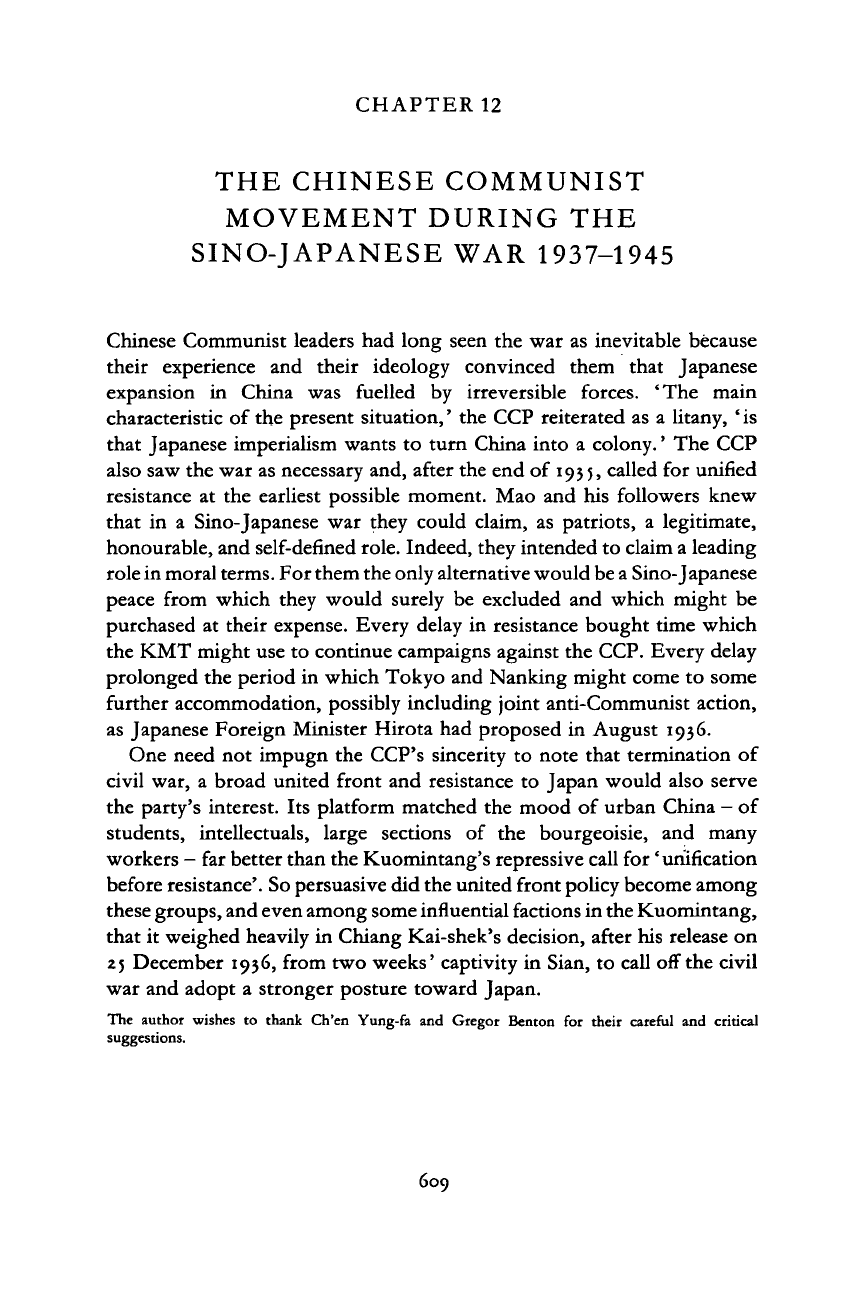
CHAPTER 12
THE CHINESE COMMUNIST
MOVEMENT DURING THE
SINO-JAPANESE WAR 1937-1945
Chinese Communist leaders had long seen the war as inevitable because
their experience
and
their ideology convinced them that Japanese
expansion
in
China
was
fuelled
by
irreversible forces.
'The
main
characteristic
of
the present situation,' the CCP reiterated as
a
litany, ' is
that Japanese imperialism wants
to
turn China into
a
colony.' The CCP
also saw the war as necessary and, after the end
of
1935, called for unified
resistance
at
the earliest possible moment. Mao and his followers knew
that
in a
Sino-Japanese
war
they could claim,
as
patriots,
a
legitimate,
honourable, and self-defined role. Indeed, they intended to claim a leading
role in moral
terms.
For them the only alternative would be
a
Sino-Japanese
peace from which they would surely
be
excluded
and
which might
be
purchased
at
their expense. Every delay
in
resistance bought time which
the KMT might use to continue campaigns against the CCP. Every delay
prolonged the period in which Tokyo and Nanking might come
to
some
further accommodation, possibly including joint anti-Communist action,
as Japanese Foreign Minister Hirota had proposed
in
August 1936.
One need
not
impugn the CCP's sincerity
to
note that termination
of
civil war,
a
broad united front and resistance
to
Japan would also serve
the party's interest.
Its
platform matched the mood
of
urban China
—
of
students, intellectuals, large sections
of the
bourgeoisie,
and
many
workers
—
far better than the Kuomintang's repressive call for' unification
before resistance'. So persuasive did the united front policy become among
these groups, and even among some influential factions in the Kuomintang,
that
it
weighed heavily in Chiang Kai-shek's decision, after his release on
25 December 1936, from two weeks' captivity in Sian,
to
call off the civil
war and adopt
a
stronger posture toward Japan.
The author wishes
to
thank Ch'en Yung-fa
and
Gregor Benton
for
their careful
and
critical
suggestions.
609
Cambridge Histories Online © Cambridge University Press, 2008
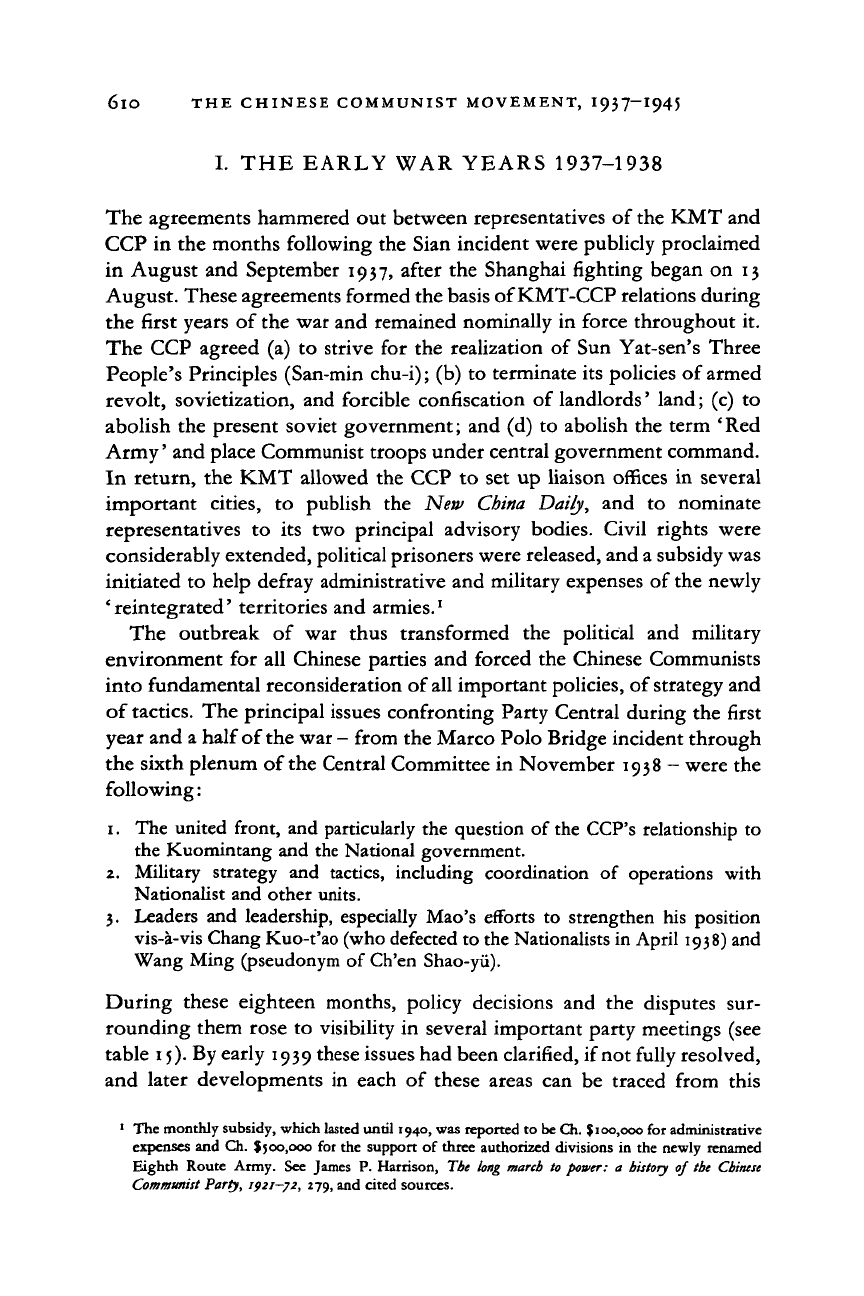
6lO THE CHINESE COMMUNIST MOVEMENT, I937-I945
I. THE EARLY WAR YEARS 1937-1938
The agreements hammered out between representatives of the KMT and
CCP
in
the months following the Sian incident were publicly proclaimed
in August and September 1937, after the Shanghai fighting began on
13
August. These agreements formed the basis of KMT-CCP relations during
the first years
of
the war and remained nominally in force throughout
it.
The CCP agreed (a)
to
strive
for
the realization
of
Sun Yat-sen's Three
People's Principles (San-min chu-i); (b) to terminate its policies of armed
revolt, sovietization, and forcible confiscation
of
landlords' land; (c)
to
abolish the present soviet government; and (d)
to
abolish the term 'Red
Army' and place Communist troops under central government command.
In return, the KMT allowed the CCP
to
set up liaison offices
in
several
important cities,
to
publish
the New
China Daily,
and to
nominate
representatives
to its
two principal advisory bodies. Civil rights were
considerably extended, political prisoners were released, and a subsidy was
initiated to help defray administrative and military expenses of the newly
' reintegrated' territories and armies.'
The outbreak
of war
thus transformed
the
political
and
military
environment
for
all Chinese parties and forced the Chinese Communists
into fundamental reconsideration of
all
important policies, of strategy and
of
tactics.
The principal issues confronting Party Central during the first
year and a half of the war
-
from the Marco Polo Bridge incident through
the sixth plenum of the Central Committee in November 1938
-
were the
following:
1.
The united front, and particularly the question of the CCP's relationship
to
the Kuomintang and the National government.
2.
Military strategy
and
tactics, including coordination
of
operations with
Nationalist and other units.
3.
Leaders and leadership, especially Mao's efforts
to
strengthen his position
vis-a-vis Chang Kuo-t'ao (who defected to the Nationalists in April
1938)
and
Wang Ming (pseudonym of Ch'en Shao-yii).
During these eighteen months, policy decisions
and the
disputes
sur-
rounding them rose
to
visibility in several important party meetings (see
table 15). By early 1939 these issues had been clarified, if not fully resolved,
and later developments
in
each
of
these areas
can be
traced from this
1
The monthly subsidy, which lasted until 1940, was repotted to be Ch. $100,000 for administrative
expenses and Ch. $500,000 for the support
of
three authorized divisions in the newly renamed
Eighth Route Army.
See
James
P.
Harrison,
The
long march
to
power:
a
history
of
the Chinese
Communist Party,
1921—72,
279, and cited sources.
Cambridge Histories Online © Cambridge University Press, 2008
